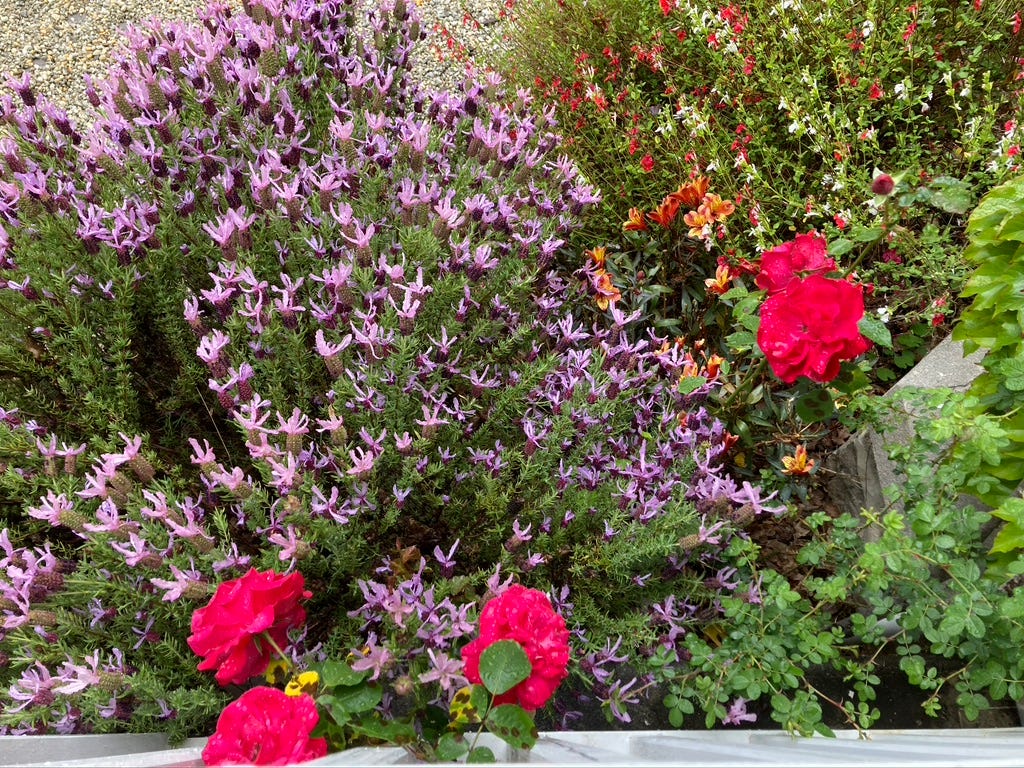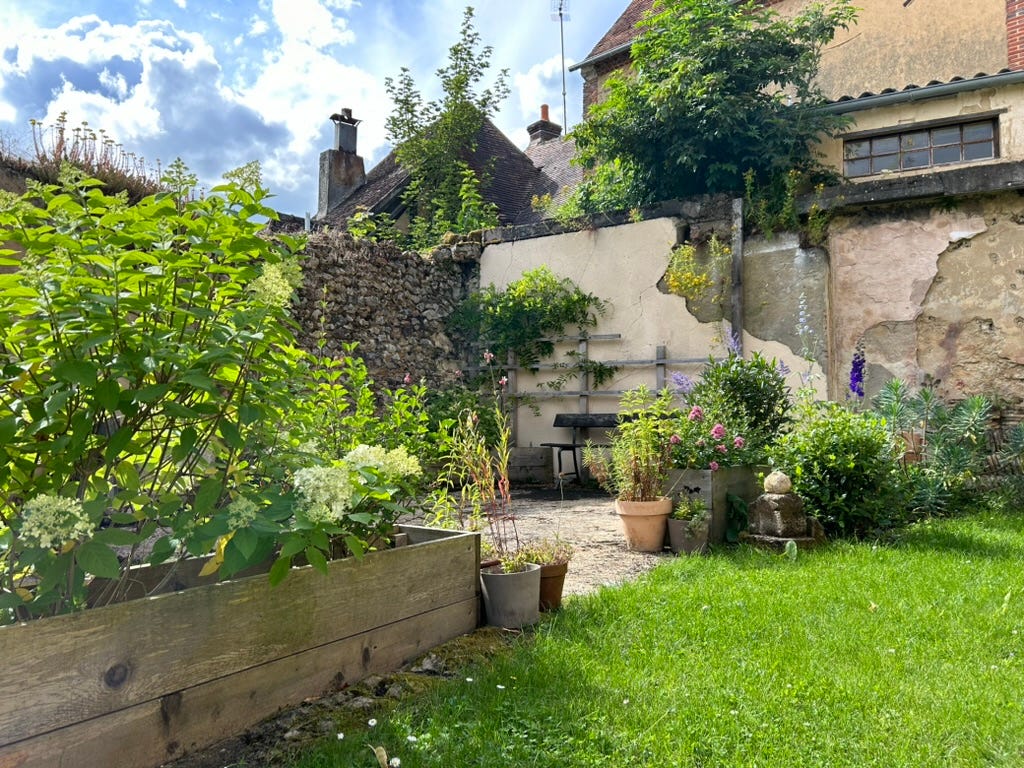How Does Your Garden Grow?
In the gentrifying countryside, landscaping is everything. It is not my strong suit.
This morning, when I saw the mayor in the street outside my kitchen window, I sprinted outside to pull her aside. She only has office hours twice a week and I can never remember when they are, so I jumped at my chance because I had urgent beef.
“What happened to our flowers?!” I asked in distress.
I was referring to Saint-Maxime’s status as a Village Fleurie. Where once the bright yellow panel that shone out just below our town sign trumpeted three flowers out of a possible four, since this fall, the flowers had disappeared. Not even one remained. Just like that.
The Villes et Villages Fleuris competition has been a thing since 1959, when France was developing its tourism industry with the energy of a freshly built nuclear power plant. This was at the peak of the country’s thirty-year postwar prosperity and population boom. Paid vacations and newly affordable cars met a nation eager to traverse their own re-beautifying country as it climbed out from the devastation of the war.
Agriculture was consolidating then, too, so there were suddenly tons of empty farmhouses on the market and a middle class flush enough to turn them into either second homes or B&Bs. The mid-1950s saw the birth of Club Med, the Relais & Chateaux hotel group, and Gites de France, a national classification that fostered the growth of mom-and-pop inns in all corners of the country. (Their poky website is still a banger resource if you like a spontaneous road trip in France.) This was an exercise in national self-love and an important step in becoming one of the most visited destinations in the world.
Les Villes et Villages Fleuris was an attempt to class up all those little towns, and gamify, if you will, civic pride in cuteness. Villages outdid each other with sustainability, ritziness and color: hanging planters rained purple petunias and fire engine-red geraniums down from lampposts. Tulips exploded from public spaces the second the sun came out from behind winter clouds. When you roll up to a village somewhere in rural France today and you see it only has two blooms on the yellow sign, you think to yourself, pffft, les nazes. (Losers.) In 1975, the European Union even adopted a continent-wide version called L’Entente Florale, which you have to love for the diplomacy pun alone.
And now Saint-Maxime had no flowers at all.
Since I noticed them missing a few months ago, I spread word of the scandale to the neighbors, and we developed some theories. In 2016, Saint-Maxime and several other villages nearby were agglomerated into a larger mothership, which meant less autonomy in decision-making. There are too many elected officials in France and too many provincial fiefdoms, so in general, I think reducing the head count is a good thing. But then you start to lose services, and you sense decline, while the big village at the nucleus of your group gets a shiny new medical complex with no doctors to fill it, possibly because somebody had a friend with a construction company, and it makes you even more chesty and protective of your little burg against the world.
Even before the infelicitous discovery of the missing flowers, Cassandre, Jean-Yves and I had been bitching about the dwindling state of Saint-Maxime’s public planting. Where once it was done by hand, the pruning on the snowball hydrangeas on the village green next to the church across the street now looked like it was done by buzzsaw. We still had lush blood-red dahlias on the embankment below the cemetery in summertime, but they had put in incongruous desert grass next to it, and it felt patchwork. The fabulous Boston ivy that covered Charlotte’s house also had a bad year and looked like it was starting to die off entirely. The tiny lawn in front of my house was never getting mowed anymore and was turning into a savannah of dandelions and stinging nettle. I use the passive voice in reference to my front yard because apart from my house, the small terrain in front actually belongs to Saint-Maxime and not me. We share this space, and it’s not always copacetic.
I moved here to create a thirst trap and now Saint-Maxime, and my house in particular, was giving Beverly Hillbillies due to institutional neglect. There is a kind of grim cold little village in France, whose left-behind high street is a row of closed shutters reeking of sadness and disdain. Were we on a fast track to becoming one of those Deliverance hellholes?
It may have occurred to you that I wasn’t entirely powerless here. Why didn’t I mow that micro-lawn myself, you may be asking? Surely if it was so important to you, you could just hop to it rather than sitting back complaining and waiting for the nanny state to come take care of it, right cowboy?
(Seriously, the bureaucrats who will interview me as part of my application for French citizenship should read this rant. They’ll have to fast-track my dossier in recognition of the fact that I am already obviously one of them.)
There are two reasons for my inaction. First, the tiny lawn and the stubby, short little rosebushes that ring it are a political sore spot for me. Because the front of my house is publicly owned, I was told by everyone that I couldn’t plant anything interesting to break up the severity of the façade. This was blocking me from realizing the full potential of my pseudo-manor. I put in some illicit Boston ivy that was starting to plump up a bit, but it wasn’t enough to do the trick. So my position was that if they were going to tell me how the front of my own house had to look, then let them deal with the upkeep. It’s just that they weren’t.
The second reason: gardening fills me with rage.
This is not something you’re supposed to admit as a country dweller. Gardening is supposed to be your rootsy connection to the earth. You’re supposed to love getting your hands dirty and talking to the bugs and pruning your hedges just so. You’re supposed to rhapsodize over your choice of plants and learn their Latin names and how to mix them.
Michel and Simon are gardening warriors. Last weekend they planted 85 tiny hornbeam hedge starters as part of a revamp they’re doing at their place. Four hours on 50-plus-year-old knees to create what will become a charming alley of green to lead you from the farmhouse to their kitchen garden. Cassandre is a dab hand too, though she’s less active now after a hip replacement. I’ve already rhapsodized over Charlotte’s skills. Jean-Yves is turning into a budding proper landscape designer and finds bliss in uprooting dandelions from lawns and making perfect straight lines when he mows.
I’ve never been great at enjoying things I’m shitty at just for the fecundity of it all. The few things I planted in the garden at my old house in Paris sputtered out and died. All that remained was what the previous owners had put in, which was enough for it to still be absolutely lovely.
One of my best gal pals back in New York moved out to the countryside around the same time I did, to Fairfield County, Connecticut. She and her husband bought a farmhouse and she, too, faced the prospect of landscaping it. She turned her flailing into a column called “The Novice Gardener” at her local newspaper. Her hook is that she can’t keep a houseplant alive, but she will consult local sages about mulching and soil chemistry and that kind of stuff. I applaud how she has made lemonade out of lemons.
Once Jean-Yves had designed and planted my backyard two summers ago, I bought a tiny little electric lawn mower and still thought I might become one of the gardening people. But the cord kept wrapping around my legs and my headphones would get disconnected from whatever podcast I would be listening to, and I’d get bitten by horseflies and constantly emptying out the trap for the cut grass would make my back ache and just fuck no to all of that.

The lawnmower that represented my amateurish hopeful joinerism quickly became a trigger. I’d be tempted to kick it when I saw it sitting innocently in my shed, waiting for me to use it at regular intervals so my little lawn wouldn’t get overrun with weeds and crabgrass. It represented my will to torpor and refusal to do simple chores that most people consider sustaining and healthy.
As someone who doesn’t like sand in her shoes or dirt under her nails, I am very happy to pay for services, even though I live in a place where they are scarce. So thank God this summer, after two years of gnashing my teeth, Jean-Yves agreed to let me hire him to come do the needful.
At first, I’d join him out there, as I also very much enjoy his company. But I have had to admit to myself that other than tying back my surprisingly successful delphiniums and the occasional weeding of beds, I do not want to deal with any of it, even as it is finally starting to look quite snappy. I’ve gotten so shitty about it there is still a plastic pot sitting next to my shed with three tiny juniper trees I pulled out of my window boxes three months ago. It stares at me lamely every time I pass by it on the way to my car.
Rather than rolling my eyes at it, I should thank my lawnmower for making me understand that I must have a certain amount of free-floating anger just below the surface. There is no other explanation for my emotional volatility in the face of an inanimate tool.
It’s good to know this about yourself, so you don’t suffer illusions that you’re nicer or more zen than you really are. Perhaps I have found self-actualization in gardening after all, by stringently, furiously avoiding it.
So when I pulled the mayor aside this morning, she laughed and told me we hadn’t lost the flowers at all. She still had to re-affix them to the town signs and just hadn’t gotten around to it yet. She also told me I could in fact put in some bushes in the front as long as I was careful to keep enough lawn space for the ham-handed municipal gardeners to get their mower around them. She just needed to have the big village sign off on my choice. That was fair enough.
And so, status anxiety alleviated, we continued to shit talk the municipal gardeners, who were indeed now constrained by our downgraded administrative status. We were a link in a historical chain of low-stakes complaining going back generations, perhaps centuries. And that is also a beautiful thing. I told her I’d send some nominations for plants in the new year. Maybe these ones I’ll even put it myself, just to commemorate the occasion. Maybe.






